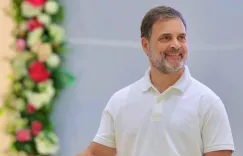How Will India Shape Global Ocean Geopolitics and Tackle Climate Challenges?

Synopsis
Key Takeaways
- India's commitment to ocean geopolitics and climate action is being solidified through new research facilities.
- NCPOR is enhancing its capabilities in polar and ocean research.
- Facilities like Polar Bhavan will support significant scientific studies.
- India's Arctic Policy and Antarctic Act provide legal frameworks for engagement in polar regions.
- Strategic, science-driven participation is key to addressing global climate initiatives.
New Delhi, May 22 (NationPress) India is set to assume a pivotal role in ocean geopolitics and tackle pressing climate issues, stated Union Minister of State (Independent Charge) for Earth Sciences, Jitendra Singh, on Thursday.
During the inauguration of Sagar Bhavan and Polar Bhavan—two groundbreaking facilities at Goa's National Centre of Polar and Ocean Research (NCPOR)—the Minister emphasized this significant advancement in India’s commitment to polar and ocean exploration.
He highlighted the growing importance of ocean geopolitics in international relations and expressed optimism that these new institutes would enhance India's geopolitical influence, enabling the nation to take on a global role.
These state-of-the-art facilities will also help the institute excel in weather pattern studies and address vital climate challenges, he remarked.
Polar Bhavan, the largest structure at the NCPOR campus, covers 11,378 square meters and was built at a cost of Rs 55 crore. It features laboratories dedicated to polar and ocean research, housing 55 rooms for scientists, a conference area, seminar hall, library, and a canteen. Additionally, it includes the newly launched SOS facility and will ultimately host India’s inaugural Polar and Ocean Museum.
Sagar Bhavan, with an area of 1,772 square meters, was constructed for Rs 13 crore and includes two ice core laboratories at minus 30 degrees Celsius and storage units at +4 degrees Celsius for preserving sediment and biological samples.
This building also contains 29 specialized rooms, including a metal-free Class 1000 clean room for trace metal and isotope research.
Singh remarked that the establishment of these facilities places NCPOR among a select group of institutions with comprehensive polar and ocean research capabilities. He emphasized that the institute’s scientific contributions are not only regionally significant but also hold global importance due to the transboundary nature of polar phenomena.
The Minister acknowledged NCPOR’s crucial role in maintaining India's research presence in vital areas such as Antarctica (with stations Maitri and Bharati), the Arctic (Himadri), and the Himalayas (Himansh).
“Institutions like NCPOR will be central to India’s scientific and strategic engagement, particularly in light of the government’s vision of Viksit Bharat by 2047,” Singh stated.
The Minister also referenced India’s Arctic Policy (2022) and the Indian Antarctic Act (2022) as essential frameworks for science-led and environmentally responsible engagement in polar regions.
He noted that the Indian Antarctic Act establishes the legal foundation for India's activities on the continent, aligning with international standards and commitments.
In recent years, India’s polar research has expanded geographically and temporally, with missions now exploring the Canadian Arctic, Greenland, and the Central Arctic Ocean across different seasons.
The Minister stressed the importance of strategic, science-driven involvement in global climate and ocean initiatives.








